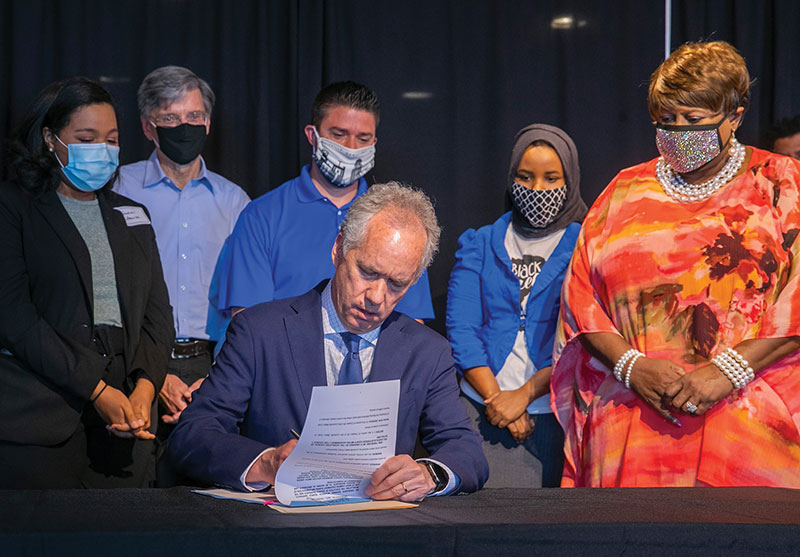By Bob Babbage and Julie Babbage

Editor’s Note: This story was originally published Aug. 13, 2020.
When Kentucky Senate President Robert Stivers teamed with Sen. Gerald Neal, the signal was clear that “no-knock warrants” were going to be substantially removed from state law, except in rare instances.
Stivers, the six-term Manchester Republican, and Neal, the Louisville Democrat in his 31st year of service, can likely deliver a sound majority. Senate Majority Leader Damon Thayer of Georgetown and Sen. John Schickel, a former U.S. marshal from Boone County, also stepped up for the change.
The bipartisan nature of this effort, similar to action taken in Louisville, stands out in a time of extreme polarization in America.
A controversial procedure used by police, the no-knock warrant is now banned in Louisville, under consideration for strict limitation by the state legislature and currently a topic before Congress.
By now, most people who have followed the news know that a “no-knock” is a warrant issued by a judge and allows police to enter a property without first knocking or ringing a doorbell and use a battering ram on a locked door.
The theory is that alleged criminals might have a moment to destroy evidence in the time it takes police to enter a property once allowed by the owner.
The increase in the use of no-knocks is dramatic. Forty years ago, there were some 1,500 a year nationwide. Eastern Kentucky University criminologist Peter Kraska tabulated 50,000 uses in 2005 alone, according to Wikipedia.
“Knock and announce” has been the law of the land since America’s inception, dating back to the 1604 “Castle Doctrine” established in Britain—the idea that one’s residence serves as one’s castle, a private place. The concept is also embedded in the Fourth Amendment concerning lawful search and seizure.
- IT’S FREE | Sign up for The Lane Report email business newsletter. Receive breaking Kentucky business news and updates daily. Click here to sign up
More recently, “stand your ground” laws have arisen, permitting property owners to defend their domicile. A recent instance citing this principle is the married couple in St. Louis who were brandishing weapons in the face of protesters who broke the gate into their neighborhood.
No-knock laws originated during the Nixon Administration’s War on Drugs and have been the subject of debate ever since. The legendary Sen. Sam Ervin, a vocal opponent of the measure, led committee hearings to assess the implementation. Public findings led to a repeal of the law just a few years later, signed by President Gerald Ford.
However, the ’80s saw a resurgence of no-knock warrants. Supreme Court rulings a decade later clarified knock-and-announce exceptions, granting state and local judges significant latitude in their determinations of necessity.
In the wake of the Breonna Taylor case, a ban on the procedure has become a rallying cry, sparking action from Kentucky leaders at every level.
Louisville Mayor Greg Fisher suspended no-knock warrants two weeks ahead of a nationally significant Metro Council decision. The Breonna’s Law ordinance, co-sponsored by all 26 members, was live-streamed to an audience outside the city building.
Metro Council President David James led the consideration by the city’s local governing body. Jessica Green, chair of the council’s Public Safety Committee, said her office received nearly 500 calls about the action in a single day.
Mounting pressure and awareness have prompted other areas, such as Lexington, to strengthen their own local policies. The Lexington law now requires sign-off by Police Chief Lawrence Weathers or an assistant chief, ensuring oversight at the highest levels. Lexington Mayor Linda Gorton followed this by instituting a moratorium on the practice, permitting no-knocks only in life or death situations.
The bipartisan move by the Kentucky Senate elevated metro decisions to a statewide conversation. Meanwhile U.S. Sen. Rand Paul has brought action before Congress with the Justice for Breonna Taylor Act—legislation that prohibits no-knock raids by federal law enforcement or police receiving federal funding.
To add, U.S. Sen. Mitch McConnell in his role as majority leader teamed with Sen. Tim Scott of South Carolina to work on a change to the no-knocks law. U.S. House Democrats have also made no-knocks action a priority in their police reform bill, with the help of Budget Chair and Louisville Congress Member John Yarmuth.
The proposal before the Kentucky General Assembly will be discussed by members over the balance of the year. Although no votes are taken during interim committee meetings, lawmakers meet every month of the off-season to examine key issues ahead of regular legislative sessions.
Breonna Taylor’s death in Louisville has clearly galvanized leaders into action with prominent Kentuckians out front—McConnell, Paul, Yarmuth, Stivers, Neal, Fischer, James, Gorton, and numerous others. ■
Bob Babbage and Julie Babbage are with Babbage Cofounder, a leading government relations firm.




















Add Comment